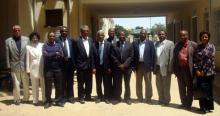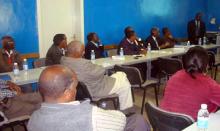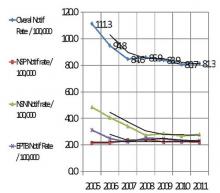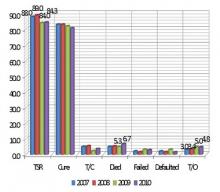Eritrea Conducted National Tuberculosis Program Review
The Ministry of Health, with the support of WHO, conducted a national TB program review from 15 to 23 March 2012.
The review was conducted with a technical support of a team of five external reviewers from the WHO Regional Office, IST, WHO Kenya and Zambia, National TB Program Manager and Lab Specialist from Malawi.
The objective of the review was to conduct an in-depth review of the status of prevention and control interventions of the TB control program in Eritrea from 2004 to 2011.
In line with the MDG targets and internationally agreed Global targets for TB control, findings of the review indicated that TB trends are declining steadily, with an average rate of 2% per year since 2005. The decline in notification rates shows declines in all the regions of the country except in Maekel & Anseba Regions.
In addition, the findings showed the notifications had an unusual predominance of New Smear Negative TB & higher Extra Pulmonary TB.
Since these proportions had remained steady in the past four years, it was pointed out that this is a peculiar area which needs further research.
Regarding retreatment cases, the proportion and trend of failure cases showed a marginal but steady rise from 2007 to 2011. MDG Treatment Success Rate (TSR) target for new smear positive TB cases was achieved in 2007 but dropped since 2009 due to rising death and transfer out rates.
The review concluded that the country has a declining TB burden and commendable TSR trend (84%) but needs to work hard to achieve the MDG TSR target of 85% by 2015.
On programme management and political commitment, the review pointed out that TB is on the priority agenda of the Government. Accordingly, the Ministry of Health has a functional TB management structure at Central, Regional, facility and station levels. Moreover, TB treatment services in the country are free of charge.
To address the gaps that were identified through the review, key recommendations were made to be implemented as a short and long term action areas. These areas are: on policy and programme management, basic TB DOTS, TB/HIV collaborative services, prevention and control of Drug Resistant TB, strengthening the laboratory as well as on monitoring and evaluation.
The review also highlighted on the modalities of conducting a national TB prevalence survey. Eritrea is among the 36 additional countries that met basic criteria during the Task Force Meeting of December 2007. The last prevalence survey was conducted in 2005.
To conduct the review, field work run from 15-22 March 2012, using standard interviewer administered questionnaires, direct observations, interviews, and record reviews.
Four teams of one external reviewer and 2-4 internal review facilitators were deployed to four out of the six regions of the country: Anseba, Debub, Maekel and NRS Zobas.
In each region, facilities were both purposely and randomly sampled to achieve fair representation of referral hospitals, Community Hospitals, Health Centres, and Health Stations. Training institutions were included where they existed. Community groups were also included within the regions.
A fifth team of two people was deployed at Central level to interact with policy makers, departments, Higher Education training institutions, and cross cutting institutions. Gash Barka Region was reviewed by proxy through document review and interviews with TB Coordinator due to logistical constraints to include them in the initial sampling. For the same reason, SRS Region was not reviewed even by proxy.
Prior to the external review, the WHO Country Office had supported the Ministry of Health in conducting an internal national TB program review in 2011.
Eritrea Conducted National Tuberculosis Program Review [pdf: 410.13 kB]








